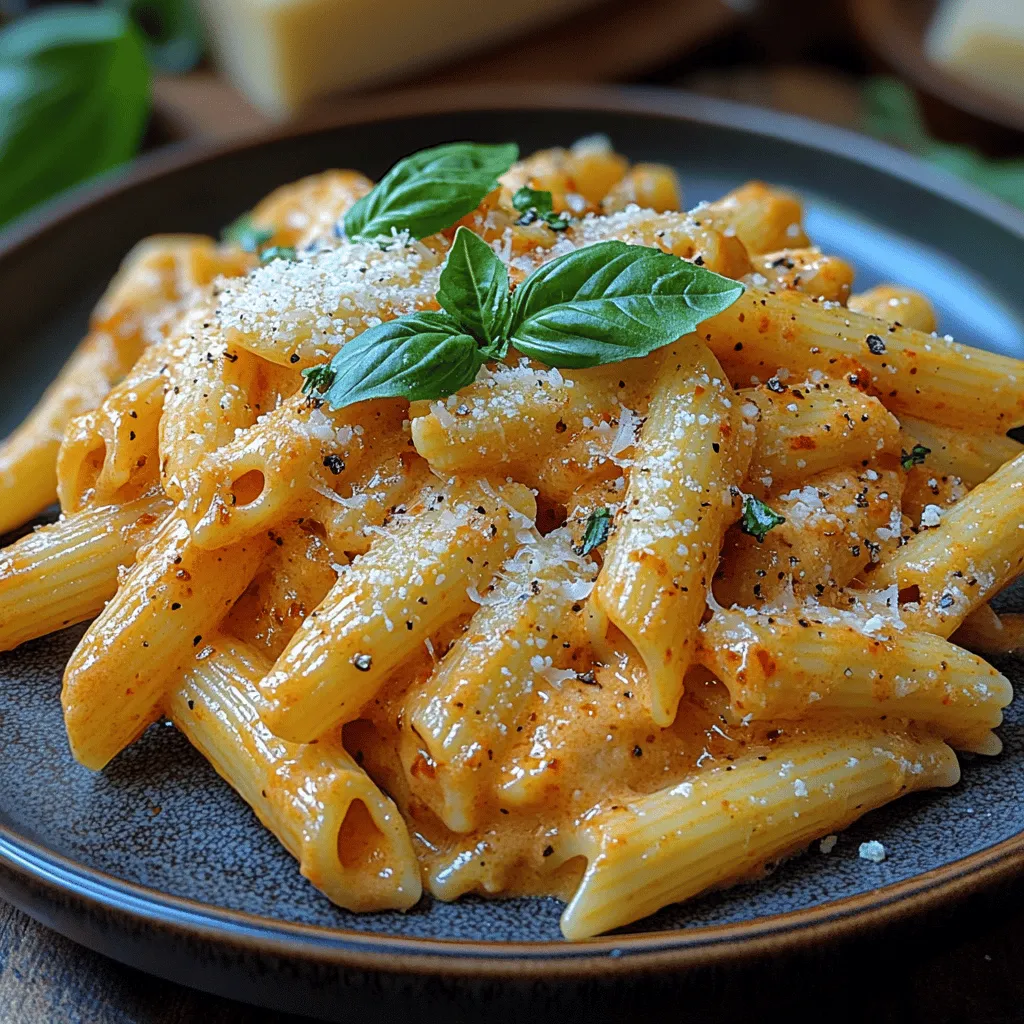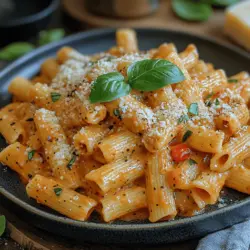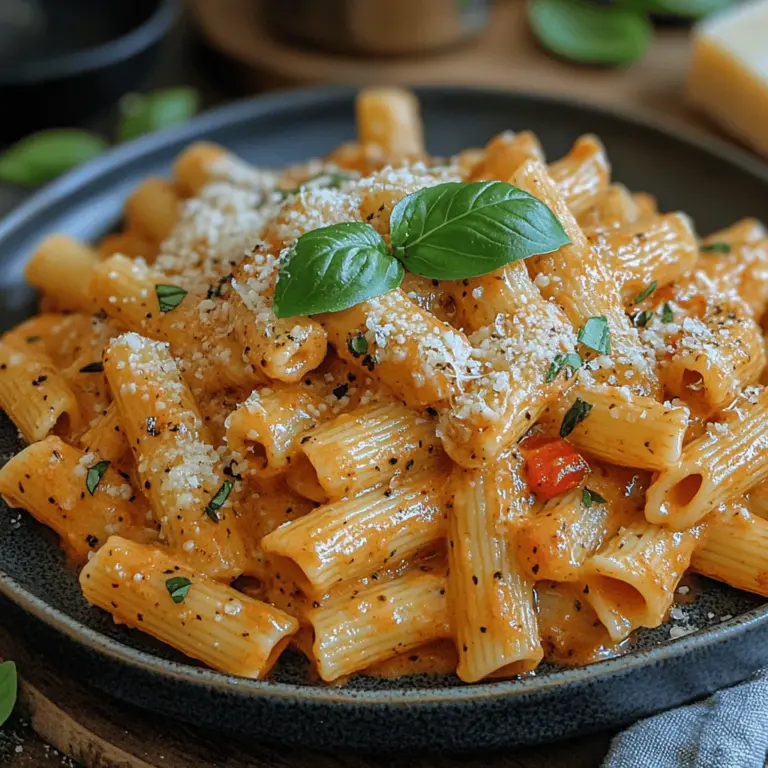Creamy Roasted Red Pepper Pasta: A Comforting Culinary Delight
If you’re in search of a dish that combines comfort, flavor, and visual appeal, look no further than creamy roasted red pepper pasta. This dish not only boasts a rich and creamy sauce but also showcases the vibrant colors and delightful flavors of roasted red peppers. Perfect for a weeknight dinner or a special occasion, this recipe is versatile enough to please any palate.
The allure of creamy roasted red pepper pasta lies in its ability to blend simplicity with sophistication. The smooth, velvety sauce envelops the pasta, creating a comforting dish that feels indulgent without being overly complicated. Whether you’re entertaining guests or enjoying a cozy meal at home, this pasta dish will undoubtedly impress.
Moreover, red peppers are more than just a pretty addition to your plate; they are also nutritional powerhouses. Packed with vitamins A and C, as well as antioxidants, red peppers offer a wealth of health benefits. Including them in your diet not only enhances the flavor of your meals but also contributes to your overall well-being.
Understanding the Ingredients
To create the perfect creamy roasted red pepper pasta, it’s essential to understand the key ingredients that contribute to its flavor and texture. Each component plays a vital role in constructing this delightful dish.
1. Red Bell Peppers: The star of the show, red bell peppers, impart a naturally sweet flavor and a vibrant hue to the dish. They are rich in vitamins, particularly vitamin C, which is known for its immune-boosting properties. The intense flavor of roasted red peppers enhances the sauce, giving it a depth that sets it apart from other pasta dishes.
2. Pasta Selection: Choosing the right pasta is crucial for achieving the desired texture and overall experience. While penne is a popular choice for its ability to hold onto the sauce, fettuccine offers a broader surface area that allows for a more luxurious coating of the creamy sauce. Both options work well, so feel free to choose based on your preference or what you have on hand.
3. Heavy Cream: This ingredient is responsible for the luscious creaminess of the sauce. Heavy cream adds a rich texture that complements the roasted peppers, creating a smooth and indulgent sauce. For those looking for a lighter version, options like half-and-half or even cashew cream can serve as alternatives.
4. Parmesan Cheese: A sprinkle of freshly grated Parmesan cheese elevates the dish, adding a nutty depth of flavor. It not only enhances the taste but also contributes to the overall creaminess of the sauce. For a dairy-free alternative, nutritional yeast can provide a similar umami flavor.
5. Italian Seasoning: A blend of herbs such as basil, oregano, and thyme, Italian seasoning enhances the flavor profile of the dish. It adds an aromatic quality that complements the sweetness of the red peppers and balances the richness of the cream.
6. Ingredient Substitutions: This recipe is highly adaptable. For those following a vegan diet, consider using coconut cream or a plant-based cream alternative in place of heavy cream and nutritional yeast instead of Parmesan. Additionally, gluten-free pasta options are widely available, allowing everyone to enjoy this comforting dish.
Roasting the Red Peppers
Roasting the red bell peppers is a crucial step that significantly enhances their flavor. This method caramelizes the natural sugars in the peppers, bringing out their sweetness and creating a smoky depth that is essential to the sauce. Below is a step-by-step guide to roasting red bell peppers to perfection.
1. Preparation: Start by washing the red peppers thoroughly under cold water. Pat them dry with a clean towel. Next, preheat your oven to 450°F (232°C). You can also use a grill or stovetop if you prefer those methods.
2. Charring the Peppers: Place the whole peppers on a baking sheet lined with parchment paper or directly on the grill grates. Roast them in the oven for about 25-30 minutes, turning occasionally, until the skins are blistered and charred. The goal is to create a beautiful char that intensifies the flavor.
3. Cooling and Peeling: Once roasted, remove the peppers from the oven and place them in a bowl. Cover the bowl with plastic wrap or a clean kitchen towel to create steam, which will make peeling easier. Let them sit for about 10-15 minutes. Afterward, peel the skins off, remove the stems and seeds, and chop the flesh into chunks.
4. Alternative Roasting Methods: If you prefer grilling, you can achieve a similar result by placing the peppers on a hot grill and turning them until charred. On the stovetop, you can use a cast-iron skillet to achieve a smoky flavor. Each method offers unique aromas and textures, so feel free to experiment.
5. Aroma and Color Changes: As the peppers roast, you’ll notice a delightful aroma filling your kitchen, signaling the development of rich flavors. The vibrant red color deepens, and the skins form a crispy exterior, creating an enticing contrast to the tender flesh inside.
Cooking the Pasta
The final step before combining the ingredients is cooking the pasta. Properly cooked pasta is essential for achieving the perfect dish, and this section will guide you through the process.
1. Choosing the Right Pot: Select a large pot to allow the pasta enough room to cook evenly. Fill it with water, ensuring there’s enough to cover the pasta completely.
2. Salting the Water: Generously salt the water before bringing it to a boil. This is a critical step; salting your pasta water enhances the flavor of the pasta itself. Aim for a ratio of about one tablespoon of salt per gallon of water.
3. Cooking to Al Dente: Once the water reaches a rolling boil, add your pasta of choice. Cook according to the package instructions, usually around 8-12 minutes, depending on the type of pasta. For the best texture, aim for al dente – tender yet firm to the bite.
4. Timing and Reserving Pasta Water: As your pasta cooks, keep an eye on the clock. When it reaches al dente, reserve about a cup of the starchy pasta water before draining. This pasta water can be a game-changer when it comes to achieving the perfect consistency in your sauce. It helps to emulsify the sauce, ensuring it clings beautifully to the pasta.
Cooking creamy roasted red pepper pasta is a delightful experience that combines the joy of cooking with the satisfaction of a delicious meal. As we move forward, we’ll explore how to bring all these elements together to create a dish that will impress your family and friends. Stay tuned for the next part of this culinary journey!

Creating the Creamy Sauce
Step-by-Step Breakdown of Blending the Roasted Peppers
To craft the rich, creamy sauce for your roasted red pepper pasta, you’ll first need to blend the roasted peppers. Begin by placing the cooled roasted red peppers into a blender or food processor. If you haven’t already, peel the skins off the peppers. This step is crucial as the skins can add a gritty texture to your sauce, which we want to avoid. Once peeled, chop the peppers roughly before adding them to the blender.
Importance of Peeling the Skins for Texture
Peeling the skins of roasted peppers may seem like a minor detail, but it significantly impacts the final texture of your sauce. The skin can be tough and bitter, detracting from the smooth and creamy experience we aim for in this dish. By ensuring that only the flesh of the peppers is blended, you create a velvety sauce that clings beautifully to the pasta.
Tips for Blending to Achieve a Creamy Consistency
When blending, add a splash of vegetable or chicken broth to help the peppers puree smoothly. Start blending on a low setting to break down the peppers, then gradually increase the speed. This technique helps achieve a creamy consistency without any chunks. If the mixture is too thick, feel free to add more broth, a little at a time, until you reach your desired creaminess. Aim for a smooth, uniform texture that will coat your pasta perfectly.
Cooking the Sauce: Combining with Broth, Cream, and Cheese
Once your roasted peppers are blended into a smooth puree, it’s time to cook the sauce. In a medium saucepan, combine the pepper puree with additional vegetable or chicken broth, heavy cream, and grated Parmesan cheese. The cheese adds a wonderful depth of flavor and rich creaminess that elevates the dish. Stir everything together over medium heat and bring the mixture to a gentle simmer.
Explanation of Simmering to Thicken the Sauce
Simmering is essential for thickening the sauce and enhancing the flavors. Allow the sauce to simmer for about 10-15 minutes, stirring occasionally. This process helps the cream reduce and the flavors meld beautifully, resulting in a luscious sauce. If the sauce becomes too thick, simply add a bit more broth or cream to achieve your preferred consistency.
Importance of Seasoning to Taste
As your sauce simmers, don’t forget to taste and adjust the seasoning. A pinch of salt, freshly cracked black pepper, and a dash of red pepper flakes can elevate the flavor profile of your sauce. Remember, seasoning is crucial as it enhances the natural sweetness of the roasted peppers and balances the richness of the cream and cheese.
Combining Pasta and Sauce
Detailed Instructions for Mixing the Cooked Pasta with the Sauce
Once your pasta is cooked al dente, reserve about a cup of the pasta water before draining it. This starchy water is a secret weapon for achieving the perfect sauce consistency. Immediately after draining, add the hot pasta directly to the saucepan with your creamy roasted red pepper sauce. Toss the pasta gently to ensure every strand is coated in the sauce.
Importance of Using Reserved Pasta Water for Texture
Incorporating the reserved pasta water is vital for the overall texture of the dish. The starch in the water helps emulsify the sauce, making it cling to the pasta more effectively. If the sauce seems too thick, gradually add a bit of the reserved pasta water, stirring continuously until the desired creaminess is achieved. This little trick ensures a perfectly cohesive dish that exudes indulgence.
Tips for Achieving the Perfect Sauce-to-Pasta Ratio
Achieving the perfect sauce-to-pasta ratio is key. You want to ensure that each bite of pasta is enveloped in the creamy sauce without drowning in it. Start with a portion of the sauce and add more as needed, allowing you to control the flavor intensity throughout the dish. The goal is a harmonious blend where the sauce complements rather than overwhelms the pasta.
Serving Suggestions
Presentation Ideas for Serving the Dish
Once plated, the creamy roasted red pepper pasta should be visually appealing. Consider serving it in shallow bowls to showcase the dish’s vibrant color. Use tongs to twirl the pasta into a nest in the center of the bowl, creating an inviting presentation. A drizzle of the sauce over the top adds an extra touch of elegance.
Garnishing with Fresh Basil and Parmesan
For a finishing touch, garnish your dish with freshly chopped basil and additional grated Parmesan cheese. The bright green basil adds a pop of color and a burst of freshness, while the cheese enhances the dish’s richness. A sprinkle of freshly cracked black pepper over the top can provide a subtle kick, elevating the overall experience.
Suggestions for Complementary Sides
To round out your meal, consider serving a crisp green salad alongside your pasta. A simple arugula or mixed greens salad with a light vinaigrette can provide a refreshing contrast to the creamy pasta. Crusty garlic bread also pairs wonderfully, perfect for sopping up any leftover sauce on the plate.
Pairing Recommendations
When it comes to beverage pairings, opt for a light white wine, such as Sauvignon Blanc or Pinot Grigio. These wines complement the creaminess of the sauce without overpowering it. For a non-alcoholic option, a sparkling water with a squeeze of lemon can refresh your palate between bites.
Health Benefits of the Ingredients
Nutritional Profile of Red Bell Peppers
Red bell peppers are not only delicious but also packed with nutrients. They are an excellent source of vitamins A and C, both of which are powerful antioxidants. Vitamin A supports eye health and immune function, while vitamin C is vital for skin health and collagen production. Additionally, red peppers are low in calories and high in fiber, making them a great addition to a balanced diet.
Discussion on the Health Aspects of Using Heavy Cream and Cheese in Moderation
While heavy cream and cheese are indulgent ingredients, using them in moderation allows you to enjoy their rich flavors without sacrificing health. Opting for a quality cheese, such as Parmesan, can enhance flavor while keeping portion sizes in check. Balancing this creamy dish with nutrient-dense ingredients, like the red peppers, helps create a meal that is both satisfying and nourishing.
Suggestions for Balancing the Meal with Vegetables or Lean Proteins
To make the meal even healthier, consider adding sautéed vegetables, such as spinach, zucchini, or broccoli, to the pasta before serving. This addition not only increases the nutritional value but also adds color and texture to the dish. For those looking to incorporate lean proteins, grilled chicken or shrimp can complement the creamy sauce beautifully.
Conclusion
In summary, creamy roasted red pepper pasta is a delightful dish that combines rich flavors with a satisfying texture. The process of blending roasted peppers into a creamy sauce, combined with perfectly cooked pasta, creates a meal that is both comforting and indulgent. Its vibrant colors and rich taste make it a perfect choice for family dinners or entertaining guests.
Encouragement to try this recipe is essential, as its ease and deliciousness offer a rewarding cooking experience. The joy of preparing and sharing meals with loved ones is a timeless tradition, and this creamy roasted red pepper pasta is sure to become a favorite in your culinary repertoire. Embrace the flavors, enjoy the cooking process, and savor each bite of this delightful dish.


